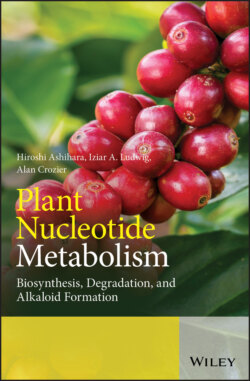Читать книгу Plant Nucleotide Metabolism - Hiroshi Ashihara - Страница 67
5 Salvage Pathways of Purine Nucleotide Biosynthesis 5.1 Introduction
ОглавлениеTraditionally the term ‘salvage’ refers to the rescue of a wrecked or disabled ship or its cargo, but it also is used in a much narrower sense in biochemistry for the recovery of preformed bases and nucleosides for the regeneration of nucleotides and nucleic acids in nucleotide metabolism. Some salvage pathways, which recycle purine bases and nucleosides for nucleotide synthesis, function in plants and other organisms (Ashihara et al. 2018; Moffatt and Ashihara 2002). The net formation of purine nucleotides is performed by the de novo pathway, but rapid turnover of nucleic acids, especially RNA, is required for nucleotide production by the salvage pathways.
In contrast to de novo purine nucleotide synthesis, which consists of energy consuming multistep reactions when compounds with a purine skeleton are available, purine nucleotides can be synthesized by simpler savage pathways. In salvage pathways, 1 mol of 5-phosphoribosyl-1-pyrophosphate (PRPP) or adenosine-5′-monophosphate (AMP) is utilized for the synthesis of 1 mol of purine nucleotides from a purine base or a purine nucleoside, respectively, by purine phosphoribosyltransferases or purine nucleoside kinases.
In plant cells, purine bases and nucleosides originate from the intercellular breakdown of nucleic acids and nucleotides, as well as other reactions which release purine bases and nucleosides. These substrates can be transported from other tissues, such as storage organs and senescing leaves. It is also possible that they are taken up by the roots from the soil where the purines are breakdown products of fallen leaves, dead insects and bacteria. Salvage of purine bases and nucleosides is performed by phosphoribosyltransferases and nucleoside kinases. Reduced salvage activity inhibits the normal growth of plants and other organisms (Ashihara et al. 2018).
In mammals, genetic deficiency of the purine base salvage enzyme, hypoxanthine/guanine phosphoribosyltransferase (HGPRT, EC 2.4.2.8), causes Lesch–Nyhan syndrome which is characterized by neurological and behavioural abnormalities and the overproduction of uric acid (Nyhan 1997). In plants, adenine phosphoribosyltransferase (APRT, EC 2.4.2.7) appears to be a more important enzyme in purine salvage than HGPRT. In addition to producing adenine nucleotides for energy metabolism and nucleic acid biosynthesis, APRT and adenosine kinase (AK) are involved in the removal of adenine and adenosine, which act as inhibitors of several reactions. These salvage enzymes are also involved in caffeine biosynthesis and the activation and inactivation of cytokinins (see Part VI). In addition, deficiency of APRT causes male sterility in plants (Gaillard et al. 1998). Thus, purine salvage is not only the energy-saving route of nucleotide biosynthesis, but is an essential pathway in plants. For a comprehensive review on purine salvage in plants, see Ashihara et al. (2018).
